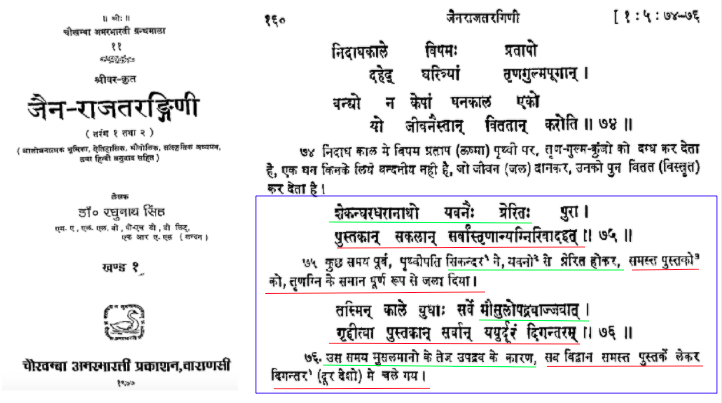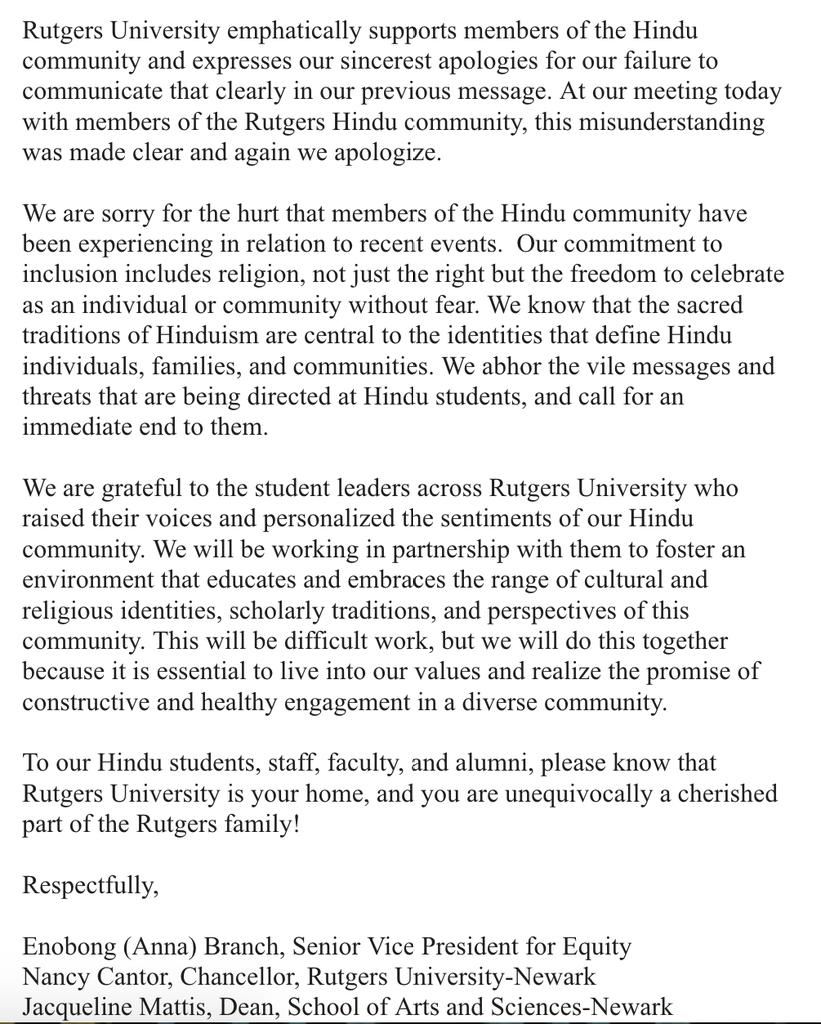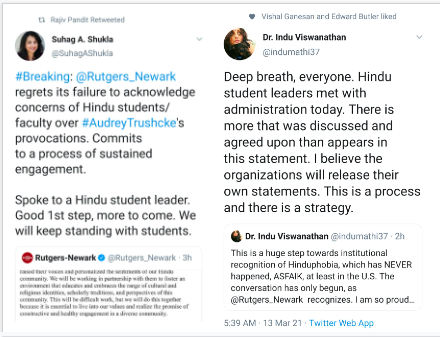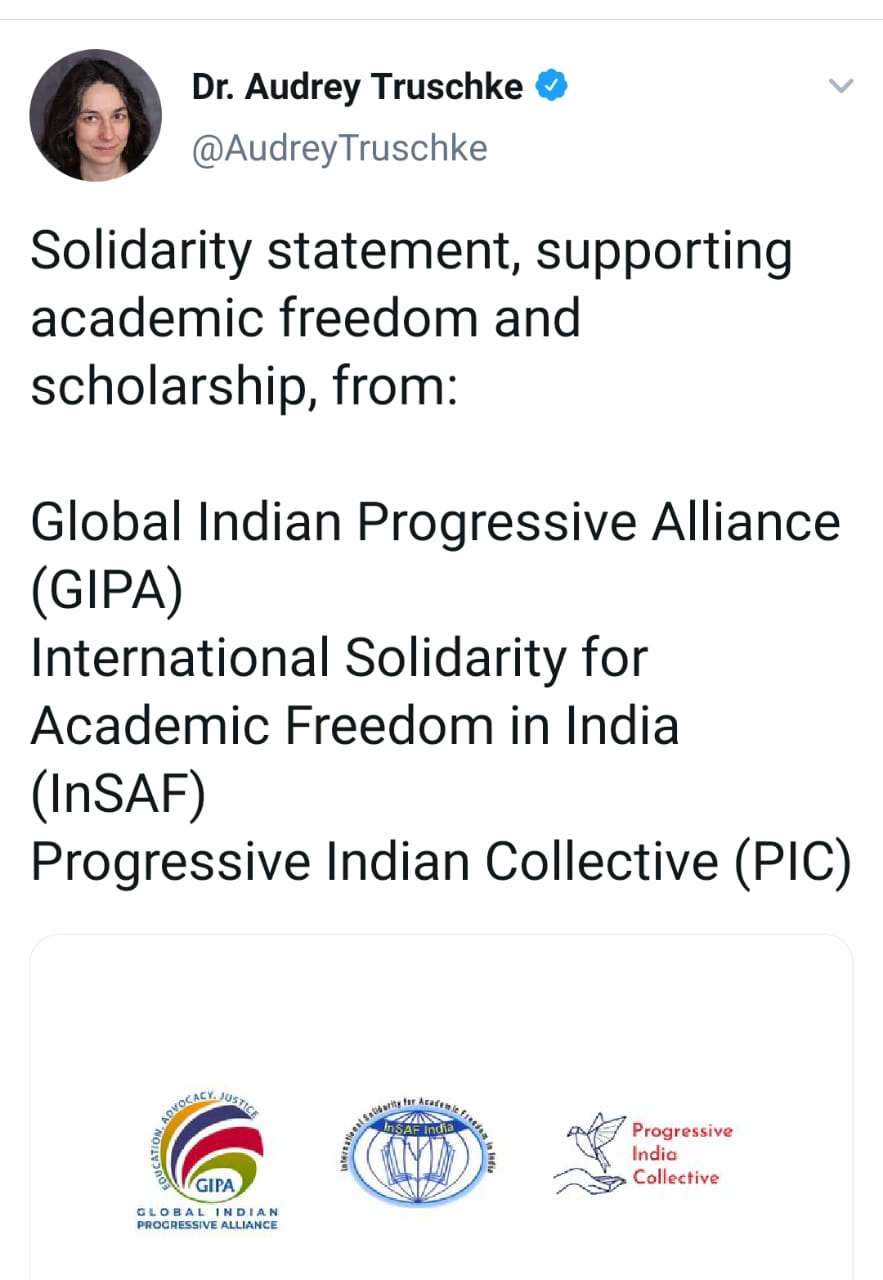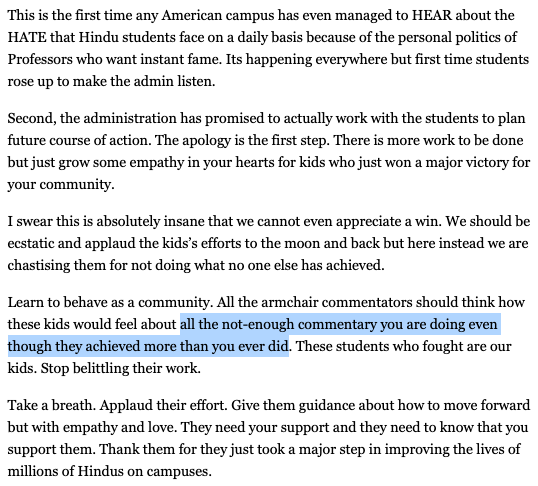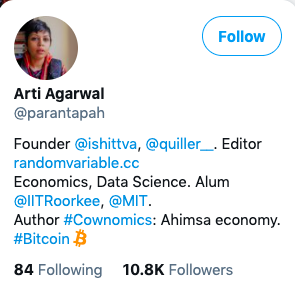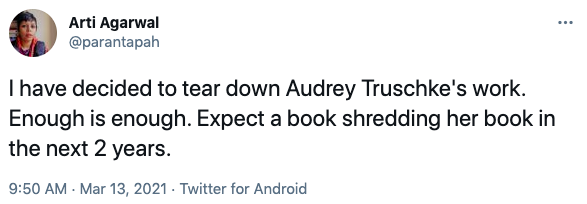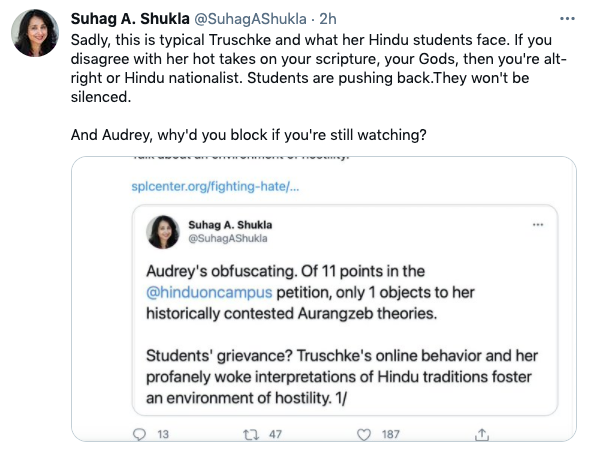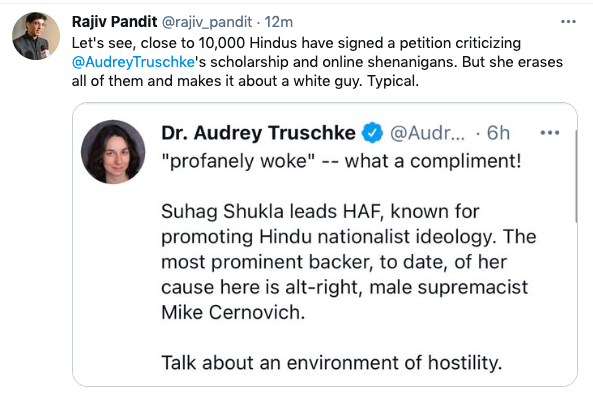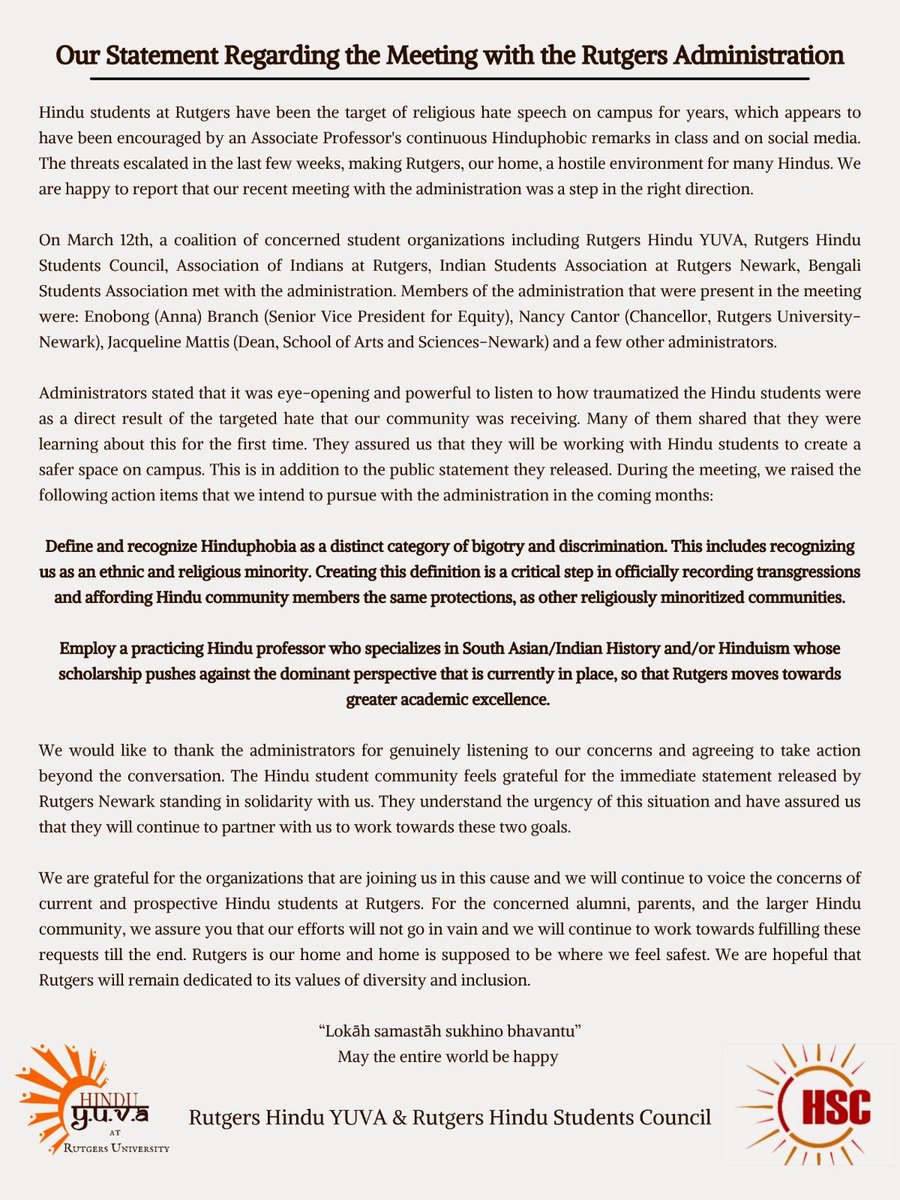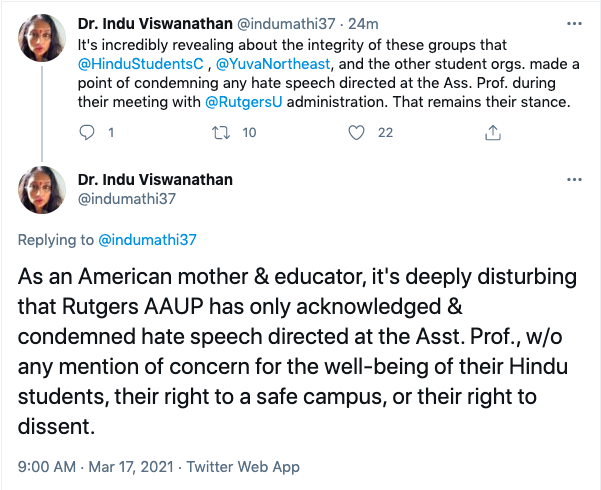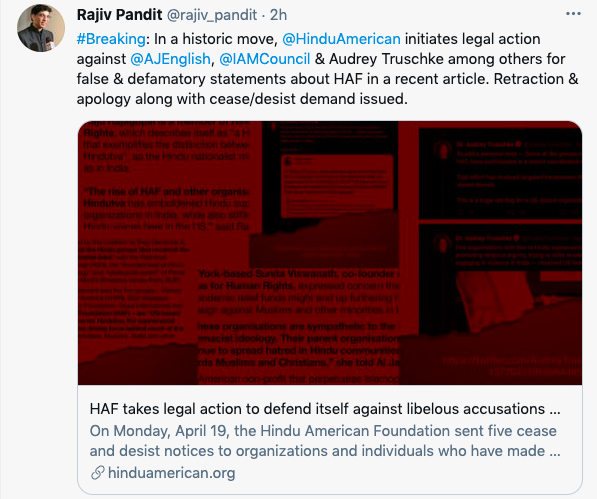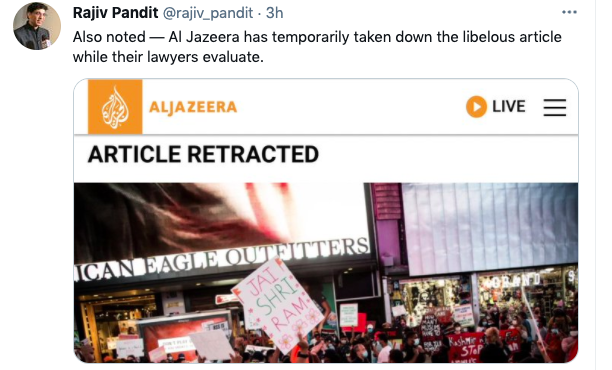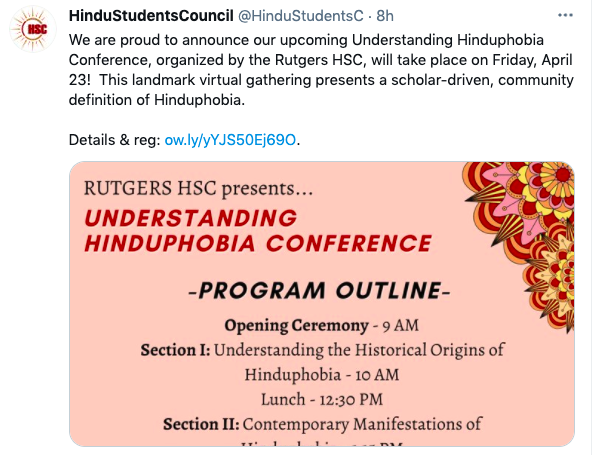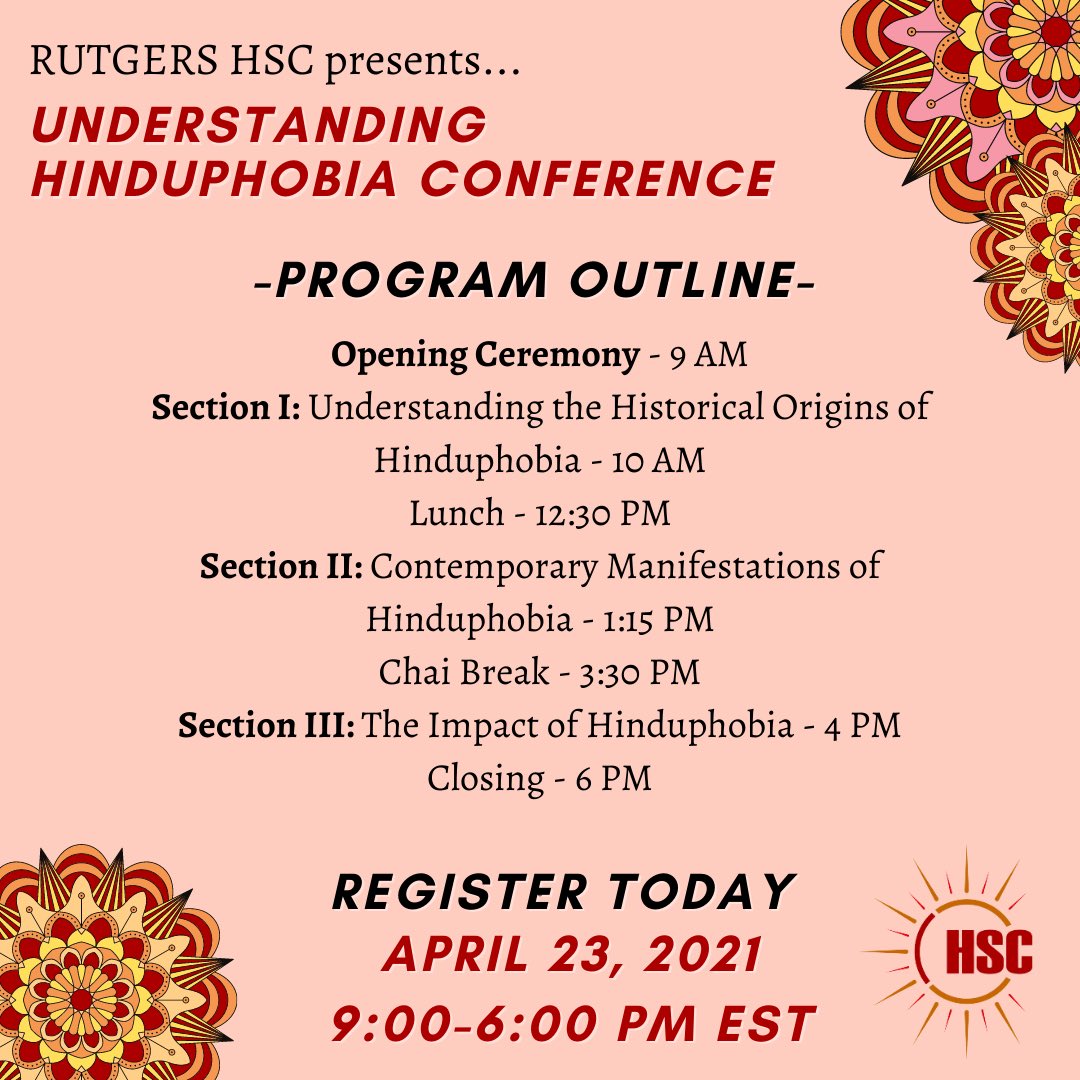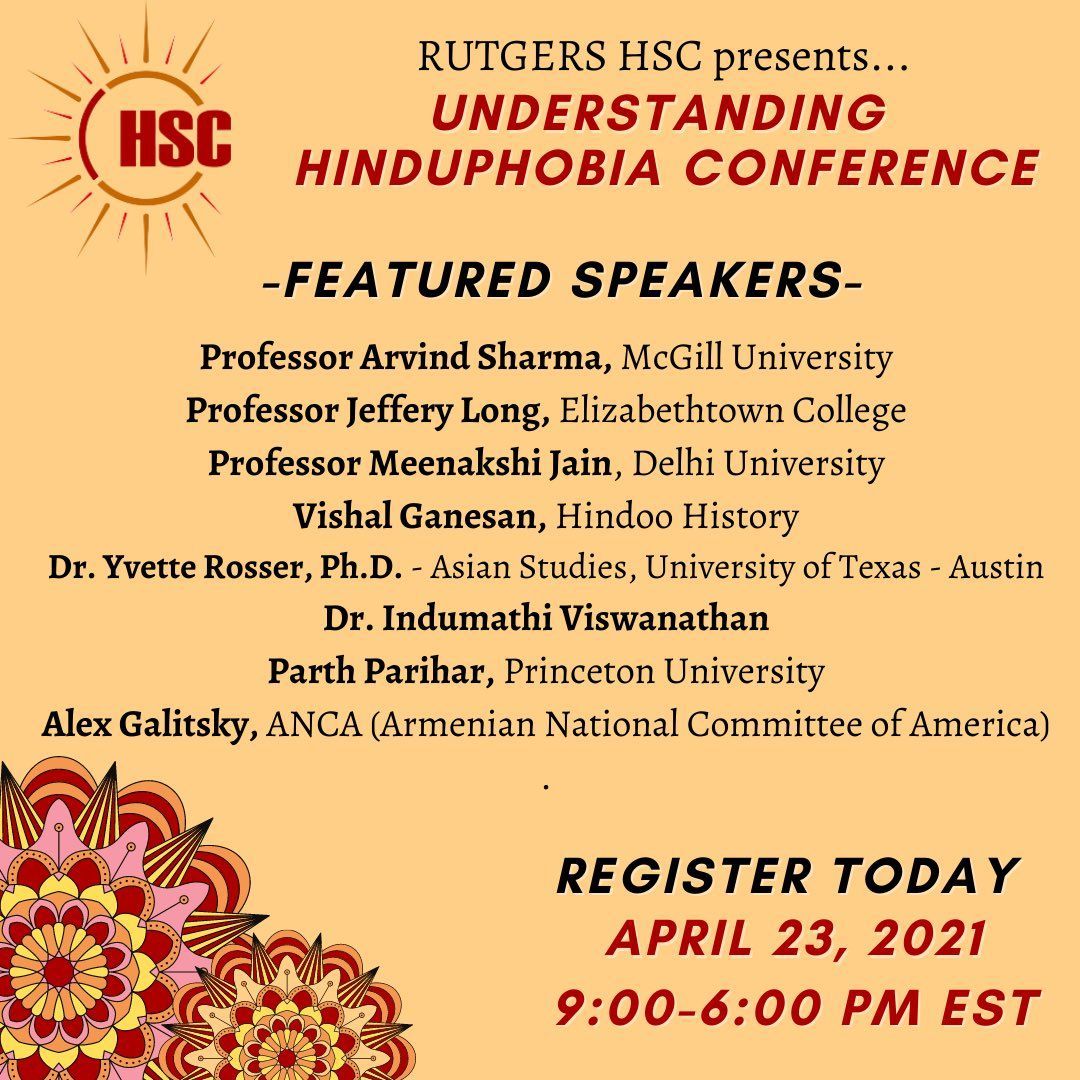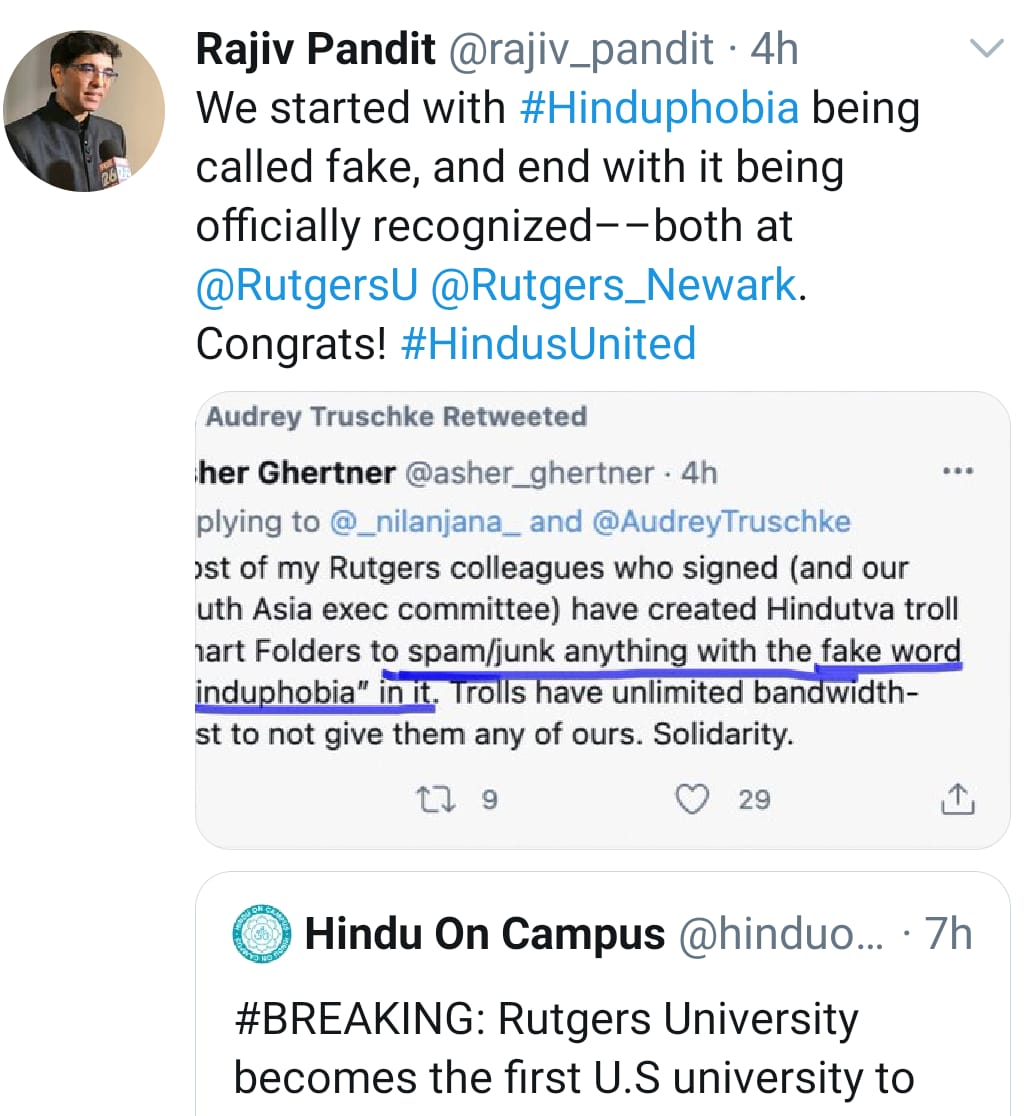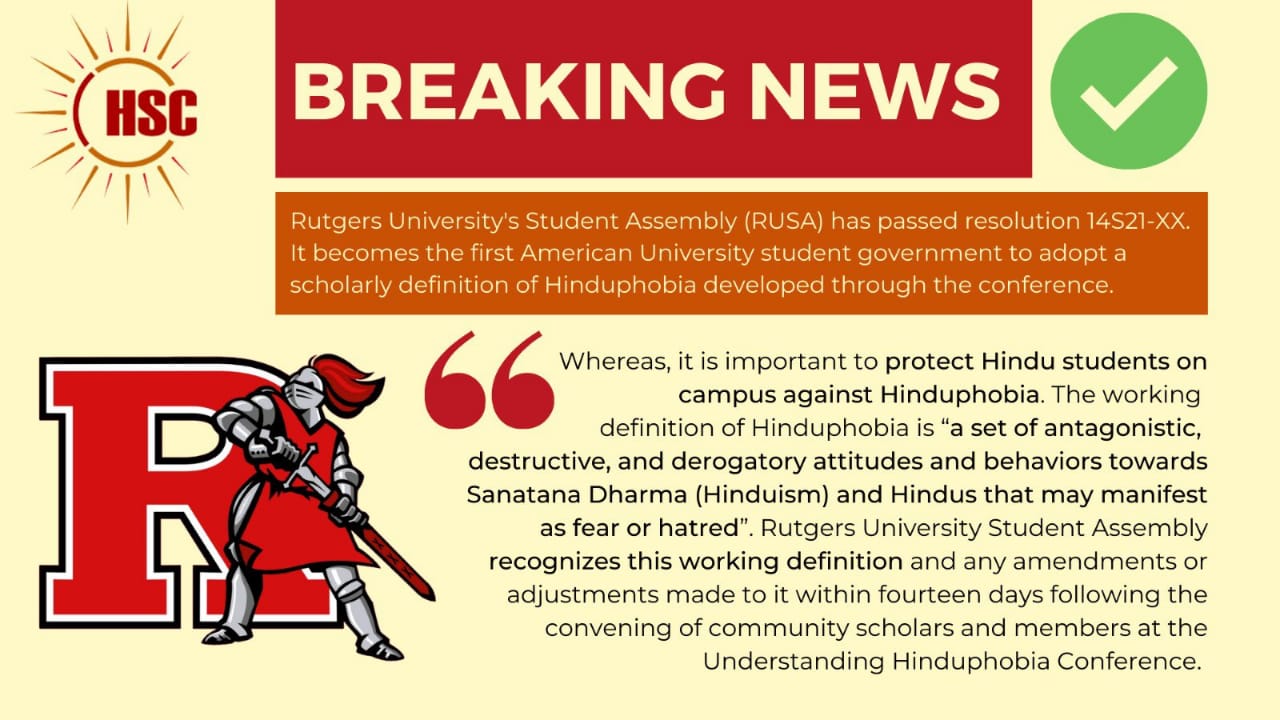Fwd: Organisation of Public Forum in WSC "the story of our Sanskrit"
Shrinivasa Varakhedi
Begin forwarded message:From: Shrinivasa Varakhedi <shri...@gmail.com>Subject: Re: Organisation of Public Forum in WSC "the story of our Sanskrit"Date: 18 July 2018 at 6:29:57 AM ISTTo: 2018 Secretariat Wsc <wsc...@ubcsanskrit.ca>, ubcsa...@gmail.comCc: kutumba sastry vempaty <kutu...@gmail.com>, Ashok Aklujkar <ashok.a...@gmail.com>, so...@staff.uni-marburg.deDear colleagues,Good morning. Returned from Vancouver with a rich experience. Thanks to the organisers.However, I am sad that so far I did not get any official response from WSC organisers except the oral response from Prof. Adheesh with a few comments that we should be open for unheard and suppressed voices and thats why this forum is cerated as a space for them. I appreciate the intention of the organisers and for showing such generosity. This was expected for other side also with an open mind.No doubt Public forum evening was all set with an agenda of non-inlclusiveness of the other side of view while advocating for inclusivity. It was very clearly evident in the entire program. Program as it was described should have been a sharing of their own experiences of deprivation. But, the trio of ladies who come from different academic and social background spoke seldom about their personal experiences on the issue as it was promised and badly projected the ancient Indian textual tradition records with lot interpretations with statements degrading women and shudras.. The same old stories were reproduced. No innovation, no new ideas or no research.The main moderator of the dialogue, though listed the questions well-articulated ones, couldn’t handle the debate on the same lines. She herself was sharing her own concepts and ideas taking examples from Ramayana which itself is a vast subject debate. It was Prof. Mandakranta Bose who was one of the member of organising committee.The second lady who was invited for discourse was Dr. Kaushal from Delhi University, whose presentation was very poor in many aspects. She just read some passages from her PhD thesis with quotation from Purushasuktam (one could make out her understanding level of sanskrit) and nothing was from her original thinking. It was a waste of time and burden to listen to her.The only nice experience of hearing Dr. Ananya Vajpeyi on these issues was the best part of the forum. She was sensible in argumentation and appealing to people. She was trying to build the theories on the basis of her own experiences and look out to Shahstras. She tried her best to secure the team from damage of whole program.But as a whole program was a mess up as it did not go in a proper line. There was a confusion among the panelists on amalgamation of Academic engagement and personal experiences. Niether was accomplished.The audience was very patient in listening to the speakers for more than one and half an hour. But, when time was up and there was no sign of creating opportunities for others from audience side, a few people got annoyed. Then with no other option the organisers had to open the floor for comments and questions from the audience. The academic points raised by few scholars like Prof. Aravind Sharma, Dr. Madhu, Dr. Mishra, were eye-opening response to the panelists. At one point sharing of Dr. Shivani's (a lady from BC) personal experiences was felt as a game-changing point. Lastly the debate ended with a nice comment by Dr. Anuradha who advocated for a heathy debate by inclusion of scholars from both sides also in the panel. It was one sided glorification on part of the organisers.But, the attempt of the trio who wanted to depict a bad picture about Indian community on an international outside the Nation utterly failed. Yet, WSC organising team is responsible for being careless in inviting people in the panel. This is an international event…that too a public forum of a prestigious conference. The IASS authorities should be cognisant of this event and are requested to be very cautious about future programs. The ideas and ideologies are to be respected but not in an unfair manner. Only academic debates shall be allowed in the conference. This was echoed in the IASS general body meet.My take : This is neither a fully academic program nor a personal experience sharing program. We should be sympathetic if somebody personal experiences are bad. We would appreciate their boldness in facing them. And we should also be ready to correct our practices. But, Such type of political programs should be avoided in future.With due respects to Dr. Adheesh for a genuine efforts in organising a wonderful academic even, I express my displeasure about this program.Warm regards,Shrinivasa VarakhediVicechancellorKvikulaguru Kalidas Sanskrit UniversityNagpur
On 10-Jul-2018, at 7:00 PM, Shrinivasa Varakhedi <shri...@gmail.com> wrote:Dear WSC Organisers,
A big Sanskrit community from India and other parts has been pondering upon an issue that is going on here in WSC organisation. Due to uncertainty of Visa and other technical issues we could not pay any attention to the programs. After arriving here we all are surprised to read the description of the Public Forum on the theme “Gender and Castism” under the title of Asmat-samskritam ….this forum is setting an agenda for the entire conference by discussing subjective experiences of some sanskritists in public place. Is there any approval for this program ? We do not see any connection to the World Sanskrit Conference with this experience sharing program.
We as scholars do not have any problem with any sort of academic deliberation. We would be happy to discuss the issues such as gender and casteism if an academic paper is presented. But, this is a public forum. It would be good if the Platform is equally shared by two different groups who take divergent positions. In contrast, only one sided party is given an opportunity to share their views. We are afraid that a wrong message will be communicated to the world about Sanskrit. Is this the objective of the WSC ?
We do not have any problem with holding an academic debate. But, this seems to be an arrangement for one sided advocacy. Moreover sharing personal experiences is not an academic exercise.
The scholars are upset about this and we oppose this kind of non-academic engagement in the WSC. We express our serious concerns about this program. The reiteration of old discarded stories are projected as the true face of Sanskrit. The ideological differences are respected, but the projection of one ideology as the fact is unreasonable and unjustifiable.
We seek a public explanation for this arrangement from the IASS and local organisers on this matter.
I am writing this mai on behalf of Sanskrit scholars community.
With warm regards,
Shrinivasa Varakhedi
Vice-chancellor
Kavikulaguru Kalidasa Sanskrit University
Nagpur
Bijoy Misra
--
You received this message because you are subscribed to the Google Groups "भारतीयविद्वत्परिषत्" group.
To unsubscribe from this group and stop receiving emails from it, send an email to bvparishat+...@googlegroups.com.
To post to this group, send email to bvpar...@googlegroups.com.
For more options, visit https://groups.google.com/d/optout.
Dr.BVK Sastry(G-MAIL)
Namaste
I concur with the views expressed in the paragraphs below by Shrinivasa Varkhedi, Vice Chancellore, KKSU , Nagpur. It is time that a global stock of ‘Samskruth Studies’ be taken up for audit by the traditional schools who are the most hurt ( by design, targeting and organized efforts) in these cases – especially by ‘ international teams’ taking shelter under the umbrella of ‘ academic freedom’.
Every nation, Religion, Community has its unique way of respecting the language of their scriptures, sacred texts, rituals and practices and culture. Samskrutham happens to be this language for ancient India, the pride of ‘ Bharateeyas’. In this sense, ‘अस्मत्संस्कृतम् Our Sanskrit’ is an appropriate title for exploration, from the traditionalists and defend it ! If ‘अस्मत्’ as a sarvanama is taken out, or interpreted badly, what would the samkalpa - vakya ‘ aham karishye’ mean ? So, ‘asmat’ here is ‘asmaakam sarveshaam samskrutham’. And this can not be anything deviating from the Panini- Patanjali- Yaska tradition ( = Vyakarana – Yoga- Nirukti) tradition.
Who then needs to be alert and active in this effort ? It is the traditional schools. And they should take it up ‘ proactive’ and issue by horns’ on a ‘ global scale’. As on date, it is already a three century old issue messy issue in the Herculean stables of academia !
Would this Battle: Sanskrit be motivated for ‘ gains of pecuniary nature, and profession’ ? It is a Yes and No. Those who have already benefitted by ‘ earlier training in tradition’ should do this as ‘ repayment of Tradition debt( vidyaa rina) for Panini ( Universal) and not for limitations of profession ( jeevikaa vrutti at select institutions) ! For the new stock, the path should be paved to make their studies worthy enough to deserve a decent livelihood.
The way in which the deliberations of ‘अस्मत्संस्कृतम्’ at WSC seems to have gone on, as described in the mail below is offensive of tradition. So, it needs express of strong displeasure followed up with corrective actions. Poor interpretation of ‘ language’ spoils the philosophy and created ‘ linguistic politics’. India has been a victim of the ‘Sanskrit Language politic’ for several decades now.
I hope this will trigger action for achieving the right goals of Samskruth studies, as it was intended to and designed for.
Regards
BVK Sastry
--
Dr.BVK Sastry(G-MAIL)
Namaste
You have raised the right questions.
The crux of the issue is the emerging new phenomenon in India / Languages / Sanskrit studies - ‘ noted as ‘ infect the political body with a political agenda ( for Languages) ’.
This is a result of multiple level failures:
(i) Institutional failures to stay by the dictum of tradition for Samskruth language studies
And
(ii) Scholars making conscious choice to use –substitute alternatives in studies using the umbrella term ‘academic freedom’ !
The traditional schools have a term for this outcome : ‘ vaanee - dur-vyaakhyaa – visha - moorchanaa’ ( borrowing Mallinathas terms). Language studies in stupor by poisoning standards of Scholar ship which affects text-interpretation.
What could be the plausible diagnosis for this scenario ?
a) Traditional schools not addressing properly and taking action to set right the ‘ political interpretation of Indian literature’
- The records of oriental conferences bear enough evidence for this ‘ ahimsaa - tolerance’ of ‘ political interpretation of Samskruth based Literature at India’.
The monumental example of such tolerance of ‘political interpretation with an overcoat of Religion and Theology’ is seen in Ramayana and Mahabharata studies.
This ‘ political interpretation of Indian Literature’ is at the root of Society divide in India, politically labelled as ‘Dalit groups’ !
b) Why people feel free to pursue such interpretation in their own campus ?
- Because the docile nature of the ‘ Traditional teams’ did not get in to from action in defending the ‘ sacredness and purity of languages of texts’ ! It is not ordinary people who do such ‘ free interpretation’ .
It is the agenda driven, academic scholar desiring a benefit who makes such ‘ interpretation sandwiches in the name of research’.
To address such social aberration, the traditional scholars went on ‘ Paanditya lane’ to find a ‘ linguistic explanation to justify the same text interpretation by use of language modeling as ‘polysemy – multivalent meaning terms –Abudiga language’ et al, in linguistics parlor. With the sole goal to defend , justify, consolidate a plurality of view points and hold together the ‘ Tradition’ ! Language ( Vak/ Bhashaa) which was designed to lead to ‘ (Shabda) Brahma –Darshana’ was used differently ! The oriental scholar using the western linguistic methods found this difficult to justify intellectually , logically and with manuscript evidence !
The question to contemplate here, would be : Why did traditional schools forget to defend the Samskruth Language position using the anchor of six binging disciplines ( Saanga- Shadanga) and several application –usage disciplines ( Upa-Veda- Shaastra – Vdyaa) and clarity on ‘Shaastra – Kaavya- Vyavahara’ usage ; and arrest the Samskruth language decay to allow ‘ free interpretations’ ? even on their own campuses ? A-Shaastreeyataa became the foundation for ‘language corruption’ and consequent downfall of culture, Identity and inviting the suffering.
The answer rests in the Socio-political dynamic history and leadership transforming Colonial Bharath to Independent resurgent India where ‘Political interpretation of Indian literature -Sanatana Dharma Documents in Samskrutham’, has been free to be interpreted by all and sundry , especially Media for entertainment and social outreach/ TRP ratings/ Political aspirations at Nations level.
The million dollar question is : What would India studies be for beyond India in such a scenario, where ‘ political interpretation of Indian literature’ is the roadmap to explore India as land of emerging economy in this side of the continent?
What is traditional schools answer beyond the ‘ Sanskrit and Yoga at Mandir’ ?
Regards
BVK Sastry
Saroja Bhate
Nagaraj Paturi
To unsubscribe from this group and stop receiving emails from it, send an email to bvparishat+unsubscribe@googlegroups.com.
To post to this group, send email to bvpar...@googlegroups.com.
For more options, visit https://groups.google.com/d/optout.
--
You received this message because you are subscribed to the Google Groups "भारतीयविद्वत्परिषत्" group.
To unsubscribe from this group and stop receiving emails from it, send an email to bvparishat+unsubscribe@googlegroups.com.
To post to this group, send email to bvpar...@googlegroups.com.
For more options, visit https://groups.google.com/d/optout.
Bijoy Misra
To unsubscribe from this group and stop receiving emails from it, send an email to bvparishat+...@googlegroups.com.
To post to this group, send email to bvpar...@googlegroups.com.
For more options, visit https://groups.google.com/d/optout.
--
You received this message because you are subscribed to the Google Groups "भारतीयविद्वत्परिषत्" group.
To unsubscribe from this group and stop receiving emails from it, send an email to bvparishat+...@googlegroups.com.
To post to this group, send email to bvpar...@googlegroups.com.
For more options, visit https://groups.google.com/d/optout.
--Nagaraj PaturiHyderabad, Telangana, INDIA.BoS, MIT School of Vedic Sciences, Pune, MaharashtraBoS, Chinmaya Vishwavidyapeeth, Veliyanad, KeralaFormer Senior Professor of Cultural StudiesFLAME School of Communication and FLAME School of Liberal Education,(Pune, Maharashtra, INDIA )
--
You received this message because you are subscribed to the Google Groups "भारतीयविद्वत्परिषत्" group.
To unsubscribe from this group and stop receiving emails from it, send an email to bvparishat+...@googlegroups.com.
Ravi Kumar
To unsubscribe from this group and stop receiving emails from it, send an email to bvparishat+...@googlegroups.com.
To post to this group, send email to bvpar...@googlegroups.com.
For more options, visit https://groups.google.com/d/optout.
--
You received this message because you are subscribed to the Google Groups "भारतीयविद्वत्परिषत्" group.
To unsubscribe from this group and stop receiving emails from it, send an email to bvparishat+...@googlegroups.com.
To post to this group, send email to bvpar...@googlegroups.com.
For more options, visit https://groups.google.com/d/optout.
Nagaraj Paturi
To unsubscribe from this group and stop receiving emails from it, send an email to bvparishat+unsubscribe@googlegroups.com.
To post to this group, send email to bvpar...@googlegroups.com.
For more options, visit https://groups.google.com/d/optout.
Ganesh R
Ravi Kumar
Nagaraj Paturi
To unsubscribe from this group and stop receiving emails from it, send an email to bvparishat+unsubscribe@googlegroups.com.
To post to this group, send email to bvpar...@googlegroups.com.
For more options, visit https://groups.google.com/d/optout.
Nagaraj Paturi
Jayaraman
Ravi Kumar
Nagaraj Paturi
--
You received this message because you are subscribed to the Google Groups "भारतीयविद्वत्परिषत्" group.
To unsubscribe from this group and stop receiving emails from it, send an email to bvparishat+unsubscribe@googlegroups.com.
To post to this group, send email to bvpar...@googlegroups.com.
For more options, visit https://groups.google.com/d/optout.
Nagaraj Paturi
This perverted comment is not a typical or representative behaviour of Sanskrit scholars towards their women students.
Nagaraj Paturi
Dr.BVK Sastry(G-MAIL)
Namaste Bijoy Misra ji
Can Paninian Sanskrit studies help to fix the 4.5 billion USD project – ‘ The Brain Initiative’ ? if yes, How?
This is what I would like to push further on your analysis of ‘Story of our Sanskrit’ !
This ‘Utility –Application Building’ ( Viniyoga , as Dr. Yadu keeps repeating on this forum) for Samskruth studies needs to be answered now. And of course that was ‘Prof. Minkowski’s question also !
1. Thanks for making three pointers to
(a) the ‘new goal in Sanskrit Studies’ : To investigate and appreciate the construction of sound in human voice should be the new goal in Sanskrit studies.
(b) recognizing the challenges involved as : Though it is hard, it is as interesting as any field of advanced research. Its beauty lies in its cosmology.
(c ) Funding issue as < I would invite new researchers to get into these areas of research. Funding will show up once we show promise of work.> .
2. Certainly this is needed to overcome the deficiencies in the current model of study – research –application and social outreach’ in Sanskrit studies, in the time segment of post colonial studies to < asmat Samskrutham> . You have also identified five specific deficiencies that need to be addressed in your proposed model of Sanskrit research studies.
(1) Sanskrit is viewed as a dead language and as an archaeological tool to calibrate the past..
(2) There no understanding or respect to the Sanskrit sounds. Sanskrit is converted to another language for interpretation.
(3) This translation is inherently flawed because of faulty mapping and the built-in cultural bias.
(4) Back in India, Sanskrit is used as a tool for religious practice. Because of the latter there is verbatim adherence leading to dogmatic conservatism.
The complexity of appreciating a world of sounds reduces to a world of mechanical words.
(5) That Sanskrit is the natural scientific expression of the human voice is lost in the slogans.
It is not the examination of the past, but it is the investigation that human voice is a biological evolution and has the capacity to render information in translating thoughts.
3. What you are asking is precisely the model of ‘Samskruth studies’ as ‘ Yoga’ in ‘ Panini Sampradaya’ demanding ‘ Samskruth Language studies, where ‘ Vyakarana ( = grammar) is sandwiched and built between the disciplines (i) the foundation of Shikshaa (= Human Voice Articulation ; and not script symbol of a specific historical period OR transliterated Romanized equivalent) ( ii) Connected to Nirukta ( = to render information in translating thoughts) (iii) Flowing Words with rhythm ( Chandas).
This system –pedagogy is given a traditional name ‘ Vedanga Vyakarana Shikshana Sampradaya’. And this is historically pre-Paninian ! and continued till ‘Bhattoji Deekshita’ ! at India, and as a part of ‘ Vedic Gurukul learning system’. The ‘ Masters- Instructors’ of this system –pedagogy still live in India, albeit numerically on finger count and past half- life age mark ( of at least 60 years) . They are neither interested in the < asmat Samskrutham> or the < university titles and honors> ! They just prefer to use ‘ Vyakarana’ for ‘Shabda- Brahma – Darshana / Sarasvati upaasanaa’ as ‘ Vak-Yoga’ for self-benefit.
If modern researchers really think that ‘Sanskrit’ holds a real potential worth a ‘funding’ , they need to proactively seek the Masters and learn the tradition. The ‘ invited lectures, semester long courses for scholarship’, YouTube- social media viral videos just create noise. These fail push right buttons to start the required research. The Battle: (Swadesi) Sanskrit would help to keep the subject in public awareness. But it can not give traction to research studies, which needs a different breed of scholars and investigators. The greater challenge is to clean up the mess that is floating globally around due to the five specific deficiencies identified by you.
In view of this, the first key issue to be addressed here is to answer : Why upgrade ‘Sanskrit- Research ’ of current period to ‘ Yoga-Samskrutham - Research’ of Paninian antiquity ?
How did Yoga-Samskrutham benefit the people of Bharath ; and how this pedagogic model received a set back from the ‘Colonial period’ when ‘Vedas became the records of Tribal Aryan History’ with a ‘ PIE model language called ‘Vedic Accented Sanskrit’ , about which ‘ even Panini was confused due to his own distancing from the historical users and had to use ‘chandasi bahulam’ several times as an exception rule to accommodate Vedic terms !
Due to nurturing this ‘ inappropriate model of Sanskrit studies’, / and tolerating the damage, India that was Bharath has suffered for three centuries due to the five deficiencies listed above; and has spent millions of public tax amount and human years going the wrong way and blindly . The outcome now is Battle: (Swadesi) Sanskrit ! on ‘ Sanskrit as a Foreign language model ‘.
One may load motives in seeking funding investment for this research analysis and engagement ! That is emotional, cultural identity –pride issue.
That would not invite ‘ Science funding’.
Probably scholars-scientists like you should suggest whether this ‘Sanskrit studies’ would get funding under the 4.5 billion USD – DARPA -US program of ‘ Brain Initiative’ . Links to explore:
https://www.darpa.mil/program/our-research/darpa-and-the-brain-initiative
https://www.braininitiative.nih.gov/?AspxAutoDetectCookieSupport=1
www.sciencemag.org/news/2014/06/45-billion-price-tag-brain-initiative
https://www.scientificamerican.com/article/why-the-human-brain-project-went-wrong-and-how-to-fix-it/
And also invite the danger of ‘Handing over on silver platter, the Language of Vedas and Yoga to Corporate control and interests outside of Bharath’.
Regards
BVK Sastry
From: bvpar...@googlegroups.com [mailto:bvpar...@googlegroups.com] On Behalf Of Bijoy Misra
Sent: Wednesday, 18 July, 2018 3:48 PM
To: Bharatiya Vidvat parishad
Subject: Re: {भारतीयविद्वत्परिषत्} Fwd: Organisation of Public Forum in WSC "the story of our Sanskrit"
Bijoy Misra
Dr.BVK Sastry(G-MAIL)
Namaste Misra ji
1. Thanks for recognizing the common thought and focus in this thread. The post is little long due to the quotes used to make specific pointers and error-roots.
The end question for contemplation would be all W- and Wh questions for Samskruth Researchers ; the questions being :
(a) Who was at fault in derailing Language- pedagogy model of Samskruth studies at India, Beyond India in the past and Current Post Independence India ? - A Post mortem analysis of History and Tradition !
(b) Why ? - The Utility – Application benefit, Pride , Prejudice ? Current period jobs and livelihood, religion professions ?
(c ) How to set right this error ? - Opportunity for Leader ship and ‘ensure Safe –transmission of Safe-guarded recovered tradition ??! For Next Generation benefit
(d) Who should lead the effort through proactive investment funding ? - The challenge of Return on investment, Social benefit, Truth seeking, and Heritage Preservation as Community / Corporate / Scholars/ Social / National Responsibility.
In other words, who is the Guardian, Successor, inheriting Beneficiary of Paninian Language/s ? aka Samskrutham ? Is it appropriate to treat Sanskrit as a ‘ classical language’ ? Or is Samskruth an Universal Eternal Orphan, floating out in Space as ‘Shabda-Brahma’ ?
How may we all work to address to complete the incomplete work at Harvard, for Samskrutham ? Can a life breath be made to the infinity program ?
2. It is nothing unusual to expect Harvard to promote and stand by ‘ Greek and Latin Oratory’ even though these LANGUAGES are ‘ technically classified as ‘ CLASSICAL ’ , meaning ‘ they are out of touch with society, no more in use as spoken language in current period. ( Yet , academics refrain from using the expression ‘ Dead’ with ‘ Greek and Latin, so freely used for ‘Sanskrit: the Classical Language of Hinduism and texts of Vedic tradition’ ! In fact, the entire Sanskrit community should be ever grateful for their scholarly publications with meticulous proofing and sustained interest in a land of different faith traditions and practices.
3. Coming to ‘ Sanskrit: language Oratory and reading tradition of Sanskrit at Harvard, I refrain from making any specific observation. It is institutional prerogative and ‘ Professors Academic Freedom’ to frame the education program and instruction systems / standards; especially in Religion disciplines .
A look at the history of Sanskrit studies at Harvard reads as below ( http://static.fas.harvard.edu/registrar/ugrad_handbook/current/chapter3/sanskrit.html ):
Sanskrit has been taught regularly at Harvard College since 1872. In 1951, what had been known as the Department of Indic Philology was renamed the Department of Sanskrit and Indian Studies in order to reflect more accurately the wider range of instruction that had developed over the years. Of the present courses offered by the department, those in Sanskrit and Vedic give students access to a language that for over three thousand years has served to record, transmit, and shape major movements of Indian thought. The courses in Pali make available the primary sources for the Theravada branch of the Buddhist tradition and those in Tibetan and in Buddhist Hybrid Sanskrit do so for the Mahayana branch. The courses in Urdu-Hindi give instruction in the language of greatest political and practical importance in modern India and Pakistan. Further courses in Indian Studies teach aspects of Indian culture and thought without requiring the knowledge of an Indian language. With the establishment of a Chair for Tibetan and Himalayan Studies in 1995, a range of courses in Tibetan and Himalayan studies is now offered.
This wide range of interest is also reflected in the programs available to undergraduate concentrators in Sanskrit and Indian Studies. Three options for concentration are offered.
Option A, Sanskrit Language and Literature, is for those students who wish to focus intensively on the task of learning the Sanskrit language and developing the ability to read, in Sanskrit, such texts as the Bhagavad Gita, the Upanishads, the Epics, and, at an advanced level, works of court poetry and philosophy, grammatical studies of the Panian system, and the various Vedic texts in archaic Sanskrit. This is a challenging but rewarding program of study. In order to undertake Option A, a student must take Sanskrit 101a and 101b no later than the sophomore year. In the second year of Sanskrit study he or she will take intermediate Sanskrit and in the third year advanced Sanskrit. Beyond study of the Sanskrit language, students will work out a program of study with the Director of Undergraduate Studies or a designated adviser, drawing upon Sanskrit and Indian Studies courses and those listed as related courses.
Suffice it to say : Harvard model and ‘Gurukul training model of scholarship in Sanskrit studies ( and allied disciplines of Vedas and Shaastra’s) is at total variance since 1872 till date, for almost 146 years ! and this has gone either unnoticed OR ( tolerated with closed eyes) globally. This is a pretty long time , being an equivalent of at least seven or more generations ( taking 20 years approximate as active life of senior professors and researchers) to damagingly override Paninian language training system which survived unmodified for over three millennia at the minimum !
This is one of the reasons why native scholars do not gel well with Harvard research output in Sanskrit related disciplines ! Harvard set an anchor and a different trend for Sanskrit studies at rest of the universities and define – steer the course of ‘ SANSKRIT RESEARCH ? WHAT FOR ? HOW ? WHOSE BENEFIT ?’. Harvard received this model from Oxford , UK (https://swarajyamag.com/culture/missionaries-sanskrit-and-oxford-university-a-history ). Historical investigation takes the issue for a post-mortem analysis mode.
Gurukul based ‘Sanskrit : Language Modeling and Pedagogy’, is anchored to Panini –Patanjali- Yaska and starts with ‘ LISTEN – REPEAT – READING WRITING – VOICED TEXT FIRST’. This is called the pedagogy of human succession-transmission memory training through ‘ uccharana –anooccharana krama’ ( listen-repeat- retention) of learning, carrying the text in memory before getting to the analytics ( Dhaaranaa before vyaakhyaana)’. This ‘ Voice- Audition tradition ( Shruti- paramparaa) used in Gurukul was systematically destroyed by paving way for preferential adoption of Biblical ( Liturgical) Greek and ( Koene) Latin pedagogy model of ‘Scripted Text Studies and Translations as authority’ for Sanskrit studies.
In short, SANSKRIT STUDIES HAVE GONE WRONG BY USE OF INAPPROPRIATE LANGUAGE MODELLING FOR OVER TWO CENTURIES ; THIS HAS BEEN TOLERATED GLOBALLY AND ESPECIALLY IN INDIA. CONTRA, THE INAPPROPRIATE MODEL OF SANSKRIT STUDIES IS PROMOTED RIGHT FROM EARLY SCHOOL LEVEL THROUGHOUT ALL LEVELS OF EDUCATION PROGRAMS ( INCLUDING UNIVERSITY RESEARCH) PROGRAMS. WSC ‘ASMAT SAMSKRUTHAM’ IS JUST ONE FRUIT OF TOLERATING DECAY IN SAMSKRUTH STUDY PEDAGOGY.
What is proposed by you to be the line of investigation for Sanskrit Research as ‘construction of sound in human voice’ with a connection to < cosmology> was postulated long ago in the model of ‘ Vedangas’ by positioning Shikshaa ( Human Voice construction) and Jyotisha ( Cosmology – Astronomy- Astrology- Astro Sciences) as teamed disciplines with Vyakarana of Samskrutham. By calling ‘ Samskrutham’ as ‘Classical Language, on par with Greek and Latin’, the complete derailing in Sanskrit language education and pedagogy took place ! And that struggle is still continuing in India, to seek government benefits to ‘ Sanskrit by tagging classical language status’ !
4. What then is a ‘Classical Language’ ? -( https://en.wikipedia.org/wiki/Classical_language ) with a question for contemplation : Would Paninian language satisfy the definition of a ‘ classical language’ ? How ? How appropriate is it to put Samskrutham ( Paninian Language) on the same pedestal of Hebrew ?
QUOTE (Begin) - A classical language is a language with a literature that is classical. According to UC Berkeley linguist George L. Hart, "it should be ancient, it should be an independent tradition that arose mostly on its own, not as an offshoot of another tradition, and it must have a large and extremely rich body of ancient literature." Classical languages are typically dead languages, or show a high degree of diglossia, as the spoken varieties of the language diverge further away from the classical written language over time.
In the context of traditional European classical studies, the "classical languages" refer to Greek and Latin, which were the literary languages of the Mediterranean world in classical antiquity.
In terms of worldwide cultural importance, Edward Sapir in his book Language, would extend the list to include Chinese, Arabic, and Sanskrit:
When we realize that an educated Japanese can hardly frame a single literary sentence without the use of Chinese resources, that to this day Siamese and Burmese and Cambodgian bear the unmistakable imprint of the Sanskrit and Pali that came in with Hindu Buddhism centuries ago, or that whether we argue for or against the teaching of Latin and Greek [in schools,] our argument is sure to be studded with words that have come to us from Rome and Athens, we get some indication of what early Chinese culture and Buddhism, and classical Mediterranean civilization have meant in the world's history. There are just five languages that have had an overwhelming significance as carriers of culture. They are classical Chinese, Sanskrit, Arabic, Greek, and Latin. In comparison with these, even such culturally important languages as Hebrew and French sink into a secondary position.
In this sense, a classical language is a language that has a broad influence over an extended period of time, even after it is no longer a colloquial mother tongue in its original form. If one language uses roots from another language to coin words (in the way that many European languages use Greek and Latin roots to devise new words such as "telephone", etc.), this is an indication that the second language is a classical language. In comparison, living languages with a large sphere of influence are known as world languages. - QUOTE ( End).
5. Cha. Mu. Krishna Sastry’s Spoken Sanskrit was a ‘ language awareness creation movement’ which was the need of the time. It has done wonderfully well and achieved its goal. Now is the time to go to the next level.
6. On < We need some text that might have analyzed the depth of the sky in terms of speech sounds such that a blind can visualize the depth. In principle, it should be possible through our speech faculty, so is the thought. > we can deliberate on the specifics of this. The key is recourse to the Paninian model of ‘ Positioning VOICE learning before the SCRIPT’ :: Shikhsaa as the foundation of VYAKARANA, as listed in the Vedanga disciplines.
Freewheeling in development of a teaching course here as a ‘quick fix’ solution by getting to one of the 72 shikshaa texts would not resolve the problem . Neither a straight jump to Panini Shikshaa.
The course outline needs to integrate traditional listing of sounds, Indian system of teaching akshara-maalaa, recitation of poetry, and connect the entire program to ‘ Science basis drawn from collaborating disciplines like : Anatomy, Brain functioning, Biology, neuroscience and cognitive processes involved in Speech and Hearing, the human memory systems, the language- learning and usage, Linguistic memory . The science part has to come from West. The Language and philosophy part will come from east. Then only the exploration of ‘rasa’ would be meaningful. The key to explore is the statement : ‘ The essence of Being (Purusha) is ‘Rasa’ ; raso vai saH; Purushasya Vak- rasah’. And all this to Vedic Chanting, Gita Reading, Ramayana Recitation, Mahabharata listening and Spoken Samskruth Conversation ending with ‘ Yoga-Samskrutham for Meditation’.
An interesting read at this point could be a Forthcoming book in 2020: "Strong AI : Understanding the roots of consciousness".
Please do let me know how we may all work together.
Bijoy Misra
Ravi Kumar
The fundamental proposition would be to inquire the origin of a thought and the possible segmentation of thought in the brain for analysis and storage. We have to design new experiments to explore this. There has been some lingering statement through psychology that a thought is rooted in a word. That the word is a construct while a thought is analog has been missing in the psychologists' argument. This is where the analysis of yoga would come in. I do not know if there is research on the analysis of thought, not Freudian, but cittavṛtti.
Bijoy Misra
Ravi Kumar
Bijoy Misra
--
Nagaraj Paturi
Table of Contents
Abbreviations
Notes on the Contributors
Series Introduction, Gavin Flood
1: Introduction, Mandakranta Bose
2: Cosmological, Devotional, and Social Perspectives on the Hindu Goddess, Tracy Pintchman
3: From Magic to Deity, Matter to Persona: The Exaltation of Māyā, Bihani Sarkar
4: Lalitā, the Graceful and Enchanting Goddess of Kāncipuram, Sanjukta Gupta
5: Sri/Laksmi: Goddess of Plenitude and Ideal of Womanhood, Mandakranta Bose
6: The Elusive Sarasvati: A Goddess, a River, and the Search for the Universal in the Particular, Elizabeth Rohlman
7: Radha: Lover and Beloved of Krsna, Tracy Coleman
8: Sītā: Enduring Example for Women, Heidi Pauwels
9: Here are the Daughters: Reclaiming the Girl Child 'Kanyā, Bālā, Kumārī' in the Empowered Tales and Rituals of Śākta Tantra, Madhu Khanna
10: Becoming a Living Goddess, Brenda Beck
11: Bathukamma: The Folk Song Tradition of the Flower Goddess of Telangana in South India, Prabhavati Reddy
12: A Goddess from Bengal: Devī Manasā, Goddess of Serpents, Krishna Datta
13: Domestication of the Disorderly Devī: the Caṇ ḍī Maṅgalakāvya of Bengal, Saswati Sengupta
14: A 'Muslim' Poet in the Lap of the 'Hindu' Mother: The Freedoms and Burdens of Kazi Nazrul Islam and the Hindu Goddess Kālī in Modern Bengal, Rachel Fell McDermott
15: The Divine Mother Comes to Michigan, Tracy Pintchman
Afterword, Mandakranta Bose
To unsubscribe from this group and stop receiving emails from it, send an email to bvparishat+unsubscribe@googlegroups.com.
To post to this group, send email to bvpar...@googlegroups.com.
For more options, visit https://groups.google.com/d/optout.
--
You received this message because you are subscribed to the Google Groups "भारतीयविद्वत्परिषत्" group.
To unsubscribe from this group and stop receiving emails from it, send an email to bvparishat+unsubscribe@googlegroups.com.
To post to this group, send email to bvpar...@googlegroups.com.
For more options, visit https://groups.google.com/d/optout.
Nagaraj Paturi
Description
Nagaraj Paturi
Nagaraj Paturi
- Education up to 8th standard: This is affiliated to Uttar Pradesh Education Board and is similar to other schools in region.
- Education in 9th and 10th classes: This is affiliated to of Gurukul Kangri University, Haridwar. The course is called Vidyadhikari and is recognized by all state boards as 10th class.
- Education from 11th up-to Acharya (equivalent to MA) is affiliated to Maharishi Dayanand University, Rohtak Haryana.
Nagaraj Paturi
विद्याविनोद ( इण्टरमीडिएट ) में पाठ्य विषयों की स्वीकृत रूपरेखा
श्रेणी-11-12
अनिवार्य विषय
| संस्कृत -वाडमय (वैदिक तथा लौकिक संस्कृत-साहित्य) | अंग्रेजी |
वैकिल्पक विषयः-निम्नलिखित में से इच्छानुसार कोई तीन विषय लेने होंगेः-
| विशेष संस्कृत वाडमय (वैदिक वैदिक तथा लौकिक संस्कृत-साहित्य) | विज्ञान | हिन्दी साहित्य | इतिहास |
| राजनीति शास्त्र | मनोविज्ञान | अर्थशास्त्र | समाजशास्त्र |
| गणित | ड्रांग और पेन्ंिटंग | गृह विज्ञान या संगीत (केवल कन्याओं के लिये) |
विद्यालंकार (बी0ए0)
श्रेणी-13-14 तथा 15
अनिवार्य विषयः
| संस्कृत -वाडमय (वैदिक तथा लौकिक संस्कृत-साहित्य) | अंग्रेजी | भारतीय संस्कृति केवल एक पत्र |
वैकिल्पक विषयः-निम्नलिखित में से कोई दो विषय लेने होंगेः-
| विशेष संस्कृत वाडमय (वैदिक वैदिक तथा लौकिक संस्कृत-साहित्य) | दर्शन | हिन्दी साहित्य | इतिहास |
| मनोविज्ञान | राजनीति शास्त्र | अर्थशास्त्र | समाजशास्त्र |
| गृहविज्ञान या संगीत | गणित | ड्राइंग पेन्टिंग |
Nagaraj Paturi
Andhra Women's Sanskrit College, Rajahmundry
| Established | 1931 |
|---|
Bijoy Misra
Nagaraj Paturi
To unsubscribe from this group and stop receiving emails from it, send an email to bvparishat+unsubscribe@googlegroups.com.
To post to this group, send email to bvpar...@googlegroups.com.
For more options, visit https://groups.google.com/d/optout.
Nagaraj Paturi
Arya Samaj has been advocating women’s education since the day it was founded. As part of its policies for the up-liftment of women in the country, Kanya Gurukula Campus, Dehradun was established in 1922 by Acharya Ramdevji as a second campus of women’s education. To give real shape to the dreams of Swami Shraddhanandaji, Kanya Gurukula Campus, Hardwar was established in 1993.
Nagaraj Paturi
Nagaraj Paturi
Gangadevi, also known as Gangambika, was a 14th century princess and Sanskrit-language poet of the Vijayanagara Empire of present-day India. She was wife of Kumara Kampana, the son of the Vijayanagara king Bukka Raya I (c. 1360s-1370s).[1]
Gangadevi chronicled the story of the victory of her husband, over the Muslims in Madurai in the form of a poem. The title of the eight chapter poem was Madhura Vijayam, also known as Veerakamparaya Charitram.[2][3]
At the beginning of Madhura Vijayam, Gangadevi eulogizes several Sanskrit poets of the Telugu-speaking region, and particularly admires Tikkaya (identified with Tikkana, the author of Andhra Mahabharatam). This suggests that she was from a Telugu-speaking region.[4]
https://en.wikipedia.org/wiki/Gangadevi
Nagaraj Paturi
Why are women not allowed to chant or study the Vedas?
I am being taught to recite and chant by a pandit who is only interested in my commitment.
Ravi Kumar
2. It is nothing unusual to expect Harvard to promote and stand by ‘ Greek and Latin Oratory’ even though these LANGUAGES are ‘ technically classified as ‘ CLASSICAL ’ ,<span lang
Nagaraj Paturi
--
You received this message because you are subscribed to the Google Groups "भारतीयविद्वत्परिषत्" group.
To unsubscribe from this group and stop receiving emails from it, send an email to bvparishat+unsubscribe@googlegroups.com.
To post to this group, send email to bvpar...@googlegroups.com.
For more options, visit https://groups.google.com/d/optout.
Nagaraj Paturi
Ravi Kumar
To unsubscribe from this group and stop receiving emails from it, send an email to bvparishat+...@googlegroups.com.
To post to this group, send email to bvpar...@googlegroups.com.
For more options, visit https://groups.google.com/d/optout.
Nagaraj Paturi
Jyothi: 9341260903 -
Jyothi: 9341321308 -
Jyothi: 9341260903 -
Harnath 9242789504
Raman 9916989151
To unsubscribe from this group and stop receiving emails from it, send an email to bvparishat+unsubscribe@googlegroups.com.
To post to this group, send email to bvpar...@googlegroups.com.
For more options, visit https://groups.google.com/d/optout.
Nagaraj Paturi
Nagaraj Paturi
Sir, thank you fro the contacts. Samskrita Bharati is doing a fine job of teaching conversational samskrita to all, I am aware of that. There is also the Sanskrit google group that is involved in teaching sanskrit.I was referring to traditional teaching and traditional teachers in my query, the sort that the lady in the article was talking about.thanks
--
You received this message because you are subscribed to the Google Groups "भारतीयविद्वत्परिषत्" group.
To unsubscribe from this group and stop receiving emails from it, send an email to bvparishat+unsubscribe@googlegroups.com.
To post to this group, send email to bvpar...@googlegroups.com.
For more options, visit https://groups.google.com/d/optout.
Bijoy Misra
Thank you sir. I actually live in Hyderabad.
To unsubscribe from this group and stop receiving emails from it, send an email to bvparishat+...@googlegroups.com.
Nagaraj Paturi
To unsubscribe from this group and stop receiving emails from it, send an email to bvparishat+unsubscribe@googlegroups.com.
To post to this group, send email to bvpar...@googlegroups.com.
For more options, visit https://groups.google.com/d/optout.
--
You received this message because you are subscribed to the Google Groups "भारतीयविद्वत्परिषत्" group.
To unsubscribe from this group and stop receiving emails from it, send an email to bvparishat+unsubscribe@googlegroups.com.
To post to this group, send email to bvpar...@googlegroups.com.
For more options, visit https://groups.google.com/d/optout.
Nagaraj Paturi
'Dalit', 'Harijan’ not to be used in official papers: Centre
The Centre has asked all ministries, departments and state governments to avoid using the words ‘Dalit’ and ‘Harijan’ when referring to people belonging to Scheduled Caste communities.
NEW DELHI: The Centre has asked all ministries, departments and state governments to avoid using the words ‘Dalit’ and ‘Harijan’ when referring to people belonging to Scheduled Caste communities. The directive was issued by the Union ministry of social justice and empowerment on March 15, five days before the Supreme Court gave its verdict on the SC/ST (Prevention of Atrocities) Act.
In a letter to the chief secretaries of state governments and Union Territories, the ministry stated that they should use ‘Scheduled Caste’ and its translation in other languages for official communication. The letter refers to a January 15 order of the Madhya Pradesh High court which had asked the Centre and states to refrain from using the word ‘Dalit’.
The letter also mentions that the home ministry, on February 10, 1982, had sent a missive to states asking them to instruct the authorities issuing Scheduled Castes certificates to not to use the word ‘Harijan’.
K S Kannan
Dear colleagues,Greetings from Nagpur.The Indian scholars who attended WSC in Canada have a great quantity of wonderful and rich academic experiences to share with all of you. Thanks to organisers for creating this event.Despite that, a small but powerful public event of greater concern sought the attention of the world. It was a Public Forum on the Gender and Casteism in Sanskrit. The title of the Public Forum was अस्मत्संस्कृतम् Our Sanskrit (a sarcastic title). The panelists were : Prof. Mandakranta Bose, Dr. Koushal and Dr. Ananya Vajpeyi. The invitation describes the event as a sharing of personal experiences of three deprived ladies. It was nothing to do with the academic nature of WSC. My comments written to IASS authorities and organisers are publicly shared in BVP. More light on the program can be shed by other participants of the program.We feel that it was an attempt to defame Bharat and Sanskrit community in international forum. We have right to react.It was neither an academic program or a public political debate. Sri Cha Mu Krishna Shastry, Prof. Kutumba Shatry ji, Prof. Aravind Sharma and many others expressed there concerns in the public forum itself.Please find my mails to the organisers 1. After the event and 2 Before the event. Please comment. No political debates taking ether sides of ideologies please. BVP should express its stand and commitment for academics in Sanskrit culture.Warm regards,Shrinivasa varakhediNagpur1. My response to organisers after ….Begin forwarded message:From: Shrinivasa Varakhedi <shri...@gmail.com>Subject: Re: Organisation of Public Forum in WSC "the story of our Sanskrit"Date: 18 July 2018 at 6:29:57 AM ISTTo: 2018 Secretariat Wsc <wsc...@ubcsanskrit.ca>, ubcsa...@gmail.comCc: kutumba sastry vempaty <kutu...@gmail.com>, Ashok Aklujkar <ashok.a...@gmail.com>, so...@staff.uni-marburg.deDear colleagues,Good morning. Returned from Vancouver with a rich experience. Thanks to the organisers.However, I am sad that so far I did not get any official response from WSC organisers except the oral response from Prof. Adheesh with a few comments that we should be open for unheard and suppressed voices and thats why this forum is cerated as a space for them. I appreciate the intention of the organisers and for showing such generosity. This was expected for other side also with an open mind.No doubt Public forum evening was all set with an agenda of non-inlclusiveness of the other side of view while advocating for inclusivity. It was very clearly evident in the entire program. Program as it was described should have been a sharing of their own experiences of deprivation. But, the trio of ladies who come from different academic and social background spoke seldom about their personal experiences on the issue as it was promised and badly projected the ancient Indian textual tradition records with lot interpretations with statements degrading women and shudras.. The same old stories were reproduced. No innovation, no new ideas or no research.The main moderator of the dialogue, though listed the questions well-articulated ones, couldn’t handle the debate on the same lines. She herself was sharing her own concepts and ideas taking examples from Ramayana which itself is a vast subject debate. It was Prof. Mandakranta Bose who was one of the member of organising committee.The second lady who was invited for discourse was Dr. Kaushal from Delhi University, whose presentation was very poor in many aspects. She just read some passages from her PhD thesis with quotation from Purushasuktam (one could make out her understanding level of sanskrit) and nothing was from her original thinking. It was a waste of time and burden to listen to her.The only nice experience of hearing Dr. Ananya Vajpeyi on these issues was the best part of the forum. She was sensible in argumentation and appealing to people. She was trying to build the theories on the basis of her own experiences and look out to Shahstras. She tried her best to secure the team from damage of whole program.But as a whole program was a mess up as it did not go in a proper line. There was a confusion among the panelists on amalgamation of Academic engagement and personal experiences. Niether was accomplished.The audience was very patient in listening to the speakers for more than one and half an hour. But, when time was up and there was no sign of creating opportunities for others from audience side, a few people got annoyed. Then with no other option the organisers had to open the floor for comments and questions from the audience. The academic points raised by few scholars like Prof. Aravind Sharma, Dr. Madhu, Dr. Mishra, were eye-opening response to the panelists. At one point sharing of Dr. Shivani's (a lady from BC) personal experiences was felt as a game-changing point. Lastly the debate ended with a nice comment by Dr. Anuradha who advocated for a heathy debate by inclusion of scholars from both sides also in the panel. It was one sided glorification on part of the organisers.But, the attempt of the trio who wanted to depict a bad picture about Indian community on an international outside the Nation utterly failed. Yet, WSC organising team is responsible for being careless in inviting people in the panel. This is an international event…that too a public forum of a prestigious conference. The IASS authorities should be cognisant of this event and are requested to be very cautious about future programs. The ideas and ideologies are to be respected but not in an unfair manner. Only academic debates shall be allowed in the conference. This was echoed in the IASS general body meet.My take : This is neither a fully academic program nor a personal experience sharing program. We should be sympathetic if somebody personal experiences are bad. We would appreciate their boldness in facing them. And we should also be ready to correct our practices. But, Such type of political programs should be avoided in future.With due respects to Dr. Adheesh for a genuine efforts in organising a wonderful academic even, I express my displeasure about this program.Warm regards,Shrinivasa VarakhediVicechancellorKvikulaguru Kalidas Sanskrit UniversityNagpur2. My mail to organisers before…On 10-Jul-2018, at 7:00 PM, Shrinivasa Varakhedi <shri...@gmail.com> wrote:Dear WSC Organisers,
A big Sanskrit community from India and other parts has been pondering upon an issue that is going on here in WSC organisation. Due to uncertainty of Visa and other technical issues we could not pay any attention to the programs. After arriving here we all are surprised to read the description of the Public Forum on the theme “Gender and Castism” under the title of Asmat-samskritam ….this forum is setting an agenda for the entire conference by discussing subjective experiences of some sanskritists in public place. Is there any approval for this program ? We do not see any connection to the World Sanskrit Conference with this experience sharing program.
We as scholars do not have any problem with any sort of academic deliberation. We would be happy to discuss the issues such as gender and casteism if an academic paper is presented. But, this is a public forum. It would be good if the Platform is equally shared by two different groups who take divergent positions. In contrast, only one sided party is given an opportunity to share their views. We are afraid that a wrong message will be communicated to the world about Sanskrit. Is this the objective of the WSC ?
We do not have any problem with holding an academic debate. But, this seems to be an arrangement for one sided advocacy. Moreover sharing personal experiences is not an academic exercise.
The scholars are upset about this and we oppose this kind of non-academic engagement in the WSC. We express our serious concerns about this program. The reiteration of old discarded stories are projected as the true face of Sanskrit. The ideological differences are respected, but the projection of one ideology as the fact is unreasonable and unjustifiable.
We seek a public explanation for this arrangement from the IASS and local organisers on this matter.
I am writing this mai on behalf of Sanskrit scholars community.
With warm regards,
Shrinivasa Varakhedi
Vice-chancellor
Kavikulaguru Kalidasa Sanskrit University
Nagpur
Ramaratnam S.
Nagaraj Paturi
- the complex sacrificial religion that emerged in post-Vedic India ( c. 900 BC) under the influence of the dominant priesthood (Brahmans), an early stage in the development of Hinduism.
ADJECTIVE
Of or belonging to the highest Hindu caste, originally that of the priesthood.
‘Buddhist stupas and Brahminical temples’
Brahmanical Hinduism
David Fowler
Nagaraj Paturi
Nagaraj Paturi
Megh Kalyanasundaram
@~27:47-29:04 “…Hindu dynasties, you know, decimate Muslim ones and vice versa. And, one sort of thing I do throughout the book is I grapple with this, this violence, and the literary use of it. Because Ganga Devi, like any good Sanskrit poet, she celebrates and praises gore on the battlefield, right, and if you are not familiar with, with Sanskrit poetry concerning battles, right, you need a real strong stomach to read this stuff. There is, you know, there is corpses all over the place, there is rivers of blood, there, you know, headless corpses wandering around, sort of tripping over dead bodies, right, it is pretty intense stuff. And this was poetry {pause) seemingly for emphasis)}, in Sanskrit. So in other words, Ganga Devi, she treated the annihilation of a dynasty, and a mass amount of death, to be fodder for beautiful literature. I argue in the book that this praise of violence—both against Muslim-led dynasties and enacted by them—is actually a strategy of inclusion. And so it is not about making them out to be particularly violent, it is about including them, as, more or less like other Indian kings. And this is because in Sanskrit literature you praise a King, in part, by saying that he is quite violent, right, this was a praise, it was a good thing.” {Transcribed as heard; almost verbatim if not fully so; Emphasis added}
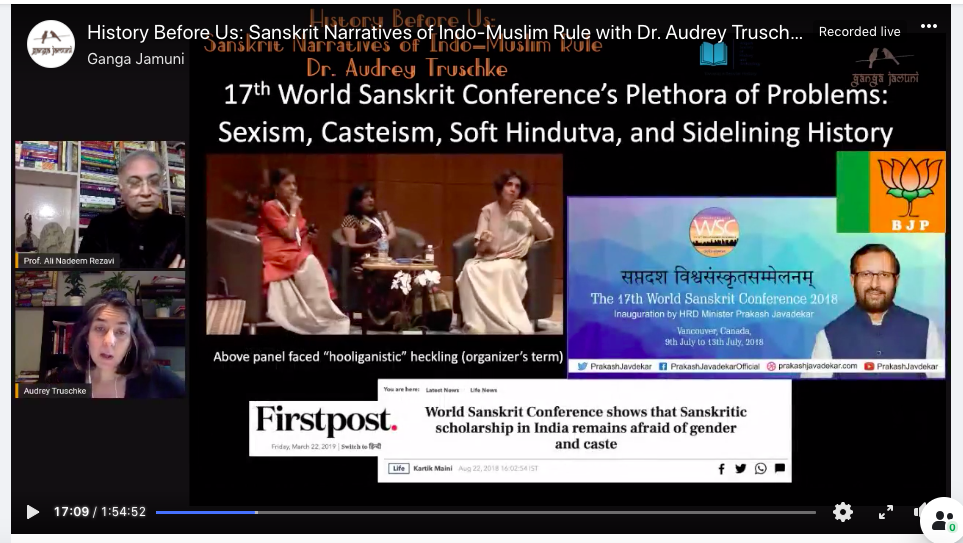
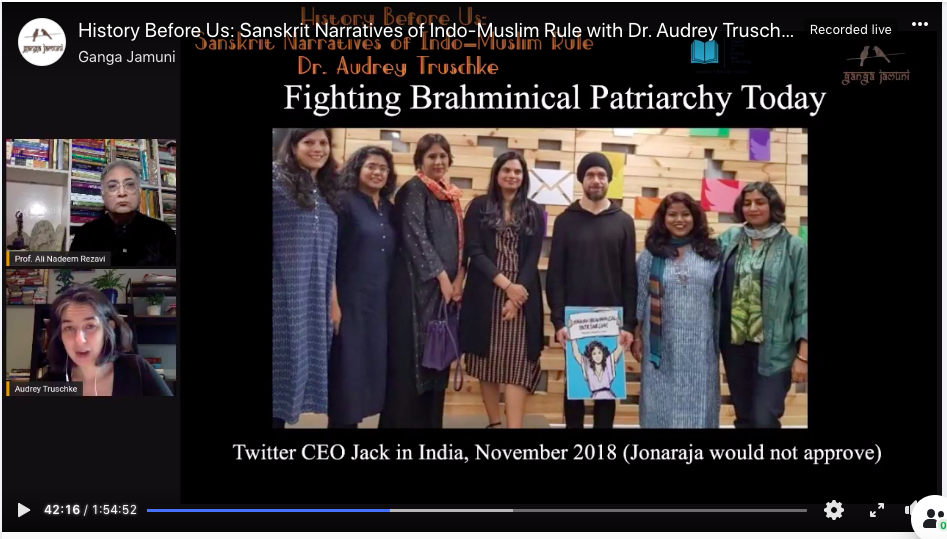
To unsubscribe from this group and stop receiving emails from it, send an email to bvparishat+...@googlegroups.com.
Megh Kalyanasundaram
~9:50 “Now, I wrote this book with funding from the National Endowment for the Humanities, which, which is the US government organisation and I am always supposed to mention that, so I guess there is still something good coming out of the US government but let’s not dwell on that too much.” {Transcribed as heard; almost verbatim if not fully so; Emphasis added}
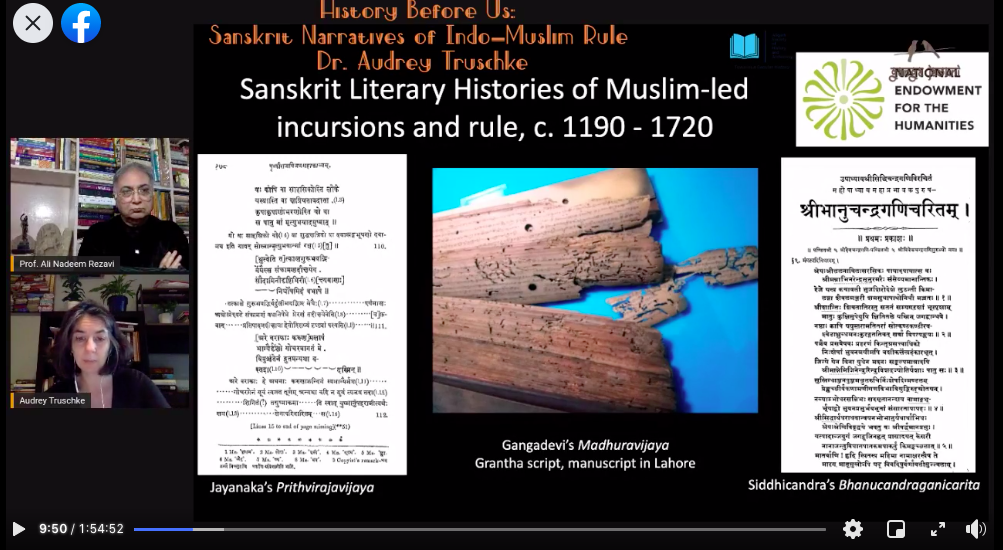
To view this discussion on the web visit https://groups.google.com/d/msgid/bvparishat/d08f3e5b-8d6f-45fb-9b3c-8560e0992dc5n%40googlegroups.com.
Megh Kalyanasundaram
~11:08-31: “...yeah and so what I want to push back there is something: it started in the past and it persists in the present, which is the idea that we, that we, want to allow Brahmins to define Sanskrit intellectual discourse. Right there so, Brahmins tried to do that in the past and many modern day Sanskrit scholars, whether knowingly or not, continue to reflect a Brahmanical bias and I think that that is inappropriate.” (Almost verbatim, if not wholly so)
Nagaraj Paturi
As a side note, let me clarify that while Akbar inaugurated Mughal engagements with Sanskrit, he did so for slightly different reasons than many people think. Akbar’s reputation is that he was open-minded and tolerant, almost a protosecular figure. This can be a misleading characterisation. Akbar was interested in Sanskrit for its political valence in his empire, not as some personal religious quest. Akbar also had no qualms about harshly judging perspectives that he viewed as beyond the pale. A good example is that he questioned Jain thinkers about whether they were monotheists because to be otherwise would mean being evicted from the Mughal court (Jains assured him that they believed in God).
To view this discussion on the web visit https://groups.google.com/d/msgid/bvparishat/CAJypMHdbo6xoDwh0wWGGz%2BtRAYE%2BVd6CGm-uv2zySdPpeStAQg%40mail.gmail.com.
Nagaraj Paturi
Nagaraj Paturi
Shankar Rajaraman
To view this discussion on the web visit https://groups.google.com/d/msgid/bvparishat/CAJGj9ebF8t--p5uRPRr%3DbVd9aUg28Q0kbS1r6D0xk8_jv5xLiA%40mail.gmail.com.
Nagaraj Paturi
To view this discussion on the web visit https://groups.google.com/d/msgid/bvparishat/CAFyW1JGh2KT5O40MsEpBMFQnP1ydfEHrwU1_im9D7k29w1MeoA%40mail.gmail.com.
Megh Kalyanasundaram
You received this message because you are subscribed to a topic in the Google Groups "भारतीयविद्वत्परिषत्" group.
To unsubscribe from this topic, visit https://groups.google.com/d/topic/bvparishat/cbthNAM0jNc/unsubscribe.
To unsubscribe from this group and all its topics, send an email to bvparishat+...@googlegroups.com.
To view this discussion on the web visit https://groups.google.com/d/msgid/bvparishat/CAJGj9ea-oqk%2BCmakXnsEyLgmHD-ve0RWtaUuLz-Td7g%3D8qvJ1A%40mail.gmail.com.
Shankar Rajaraman
To view this discussion on the web visit https://groups.google.com/d/msgid/bvparishat/CAJGj9ea-oqk%2BCmakXnsEyLgmHD-ve0RWtaUuLz-Td7g%3D8qvJ1A%40mail.gmail.com.
K S Kannan
To view this discussion on the web visit https://groups.google.com/d/msgid/bvparishat/CAFyW1JHWhScjfXpnr4PZNuykGsVRtfwDwmG7jKuC96tJNpfH1A%40mail.gmail.com.
--
Sant Rajinder Singh Ji Maharaj Chair Professor, IIT-Madras.
Senior Fellow, ICSSR, New Delhi.
Academic Director, Swadeshi Indology.
Member, Academic Council, Veda Vijnana Shodha Samsthana.
Nominated Member, IIAS, Shimla.
Former Professor, CAHC, Jain University, Bangalore.Former Director, Karnataka Samskrit
University, Bangalore.
Former Head, Dept. of Sanskrit, The
National Colleges, Bangalore.
Megh Kalyanasundaram
To view this discussion on the web visit https://groups.google.com/d/msgid/bvparishat/CAFyW1JHWhScjfXpnr4PZNuykGsVRtfwDwmG7jKuC96tJNpfH1A%40mail.gmail.com.
Shankar Rajaraman
To view this discussion on the web visit https://groups.google.com/d/msgid/bvparishat/CAJypMHeWkW8RHNobEiC1bFNUiRqiYKi345HweQV7YdtGZR%3DWxQ%40mail.gmail.com.
Veeranarayanacharya Pandurangi
To view this discussion on the web visit https://groups.google.com/d/msgid/bvparishat/CAFyW1JEN1jSAW3Jk1RhYnvQrrOogWBvodz%3DpLRa%3DZssR6X2RaQ%40mail.gmail.com.
Nagaraj Paturi
To view this discussion on the web visit https://groups.google.com/d/msgid/bvparishat/CAM%2BoyOdDtHo%3DzgBxwf7uW9%2BVL99xE22J%2Bh1v7P5qXF%2BJyAbzyQ%40mail.gmail.com.
Megh Kalyanasundaram
To view this discussion on the web visit https://groups.google.com/d/msgid/bvparishat/CAFyW1JGh2KT5O40MsEpBMFQnP1ydfEHrwU1_im9D7k29w1MeoA%40mail.gmail.com.
Megh Kalyanasundaram
4. Vikram Zutshi, March 12 2021, The Hindu: The curious case of controversial historian Audrey Truschke. Some excerpts below:
"In one tweet, Truschke referred to Rama as a “misogynist” and used a slur after the word. When asked to justify this claim, she cited a translation of the Ramayana by Robert Goldman. When Prof. Goldman was contacted, he said: “I find it extremely disturbing but perhaps not unexpected to learn that AT (Audrey Trushcke) has used such inappropriate language and passed it off as coming from Valmiki. Neither the great poet nor we used such a vulgar diction and certainly Sita would never have used such language to her husband even in the midst of emotional distress. Nowhere in our translation of the passage do we use words you mention AT as using… she is in no way quoting our translation but giving her own reading of the passage in her own highly inappropriate language.”"True to form, she targets the Kashmiri Pandit community, ...""Instead of responding with reasoned argument, Truschke trotted out a litany of the “mean tweets” and hate mail she has received. While these can be harsh, they are in no way a licence to tar all critics with the same brush."
Note the (imho, appropriation of the) word "Progressive".
Nagaraj Paturi
To view this discussion on the web visit https://groups.google.com/d/msgid/bvparishat/CAJypMHdjNCMdJzsEDqcbYXq5LMHSPW%3Ds%2BnyJWq3_4wge1DwshQ%40mail.gmail.com.
Gauri Mahulikar
To view this discussion on the web visit https://groups.google.com/d/msgid/bvparishat/CAJGj9eaqV3PZkdO7WnhkLjxfM5-v95CdPBEqv1bZJHp-WRHkTw%40mail.gmail.com.
Megh Kalyanasundaram
To view this discussion on the web visit https://groups.google.com/d/msgid/bvparishat/CAAtHFfTop15O26cZGyexa%3DS35ayg2_qUszHGUz4SHK1S8dTO1A%40mail.gmail.com.
Megh Kalyanasundaram
Megh Kalyanasundaram
Megh Kalyanasundaram
Megh Kalyanasundaram
Megh Kalyanasundaram
Mar 16 2021 | 'The Truschke Purana: A saga in Hinduphobia'
Megh Kalyanasundaram
Megh Kalyanasundaram
Megh Kalyanasundaram
Megh Kalyanasundaram
Megh Kalyanasundaram
Megh Kalyanasundaram
Megh Kalyanasundaram
Megh Kalyanasundaram
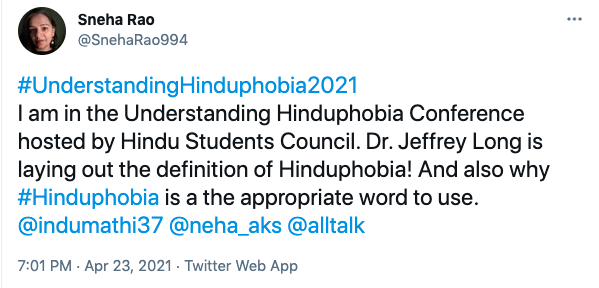
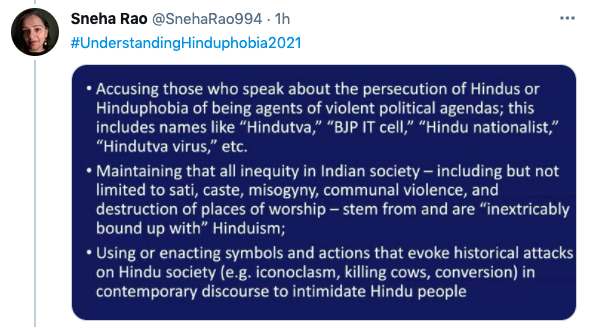
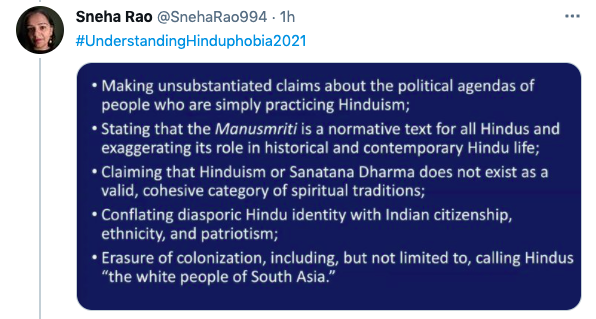
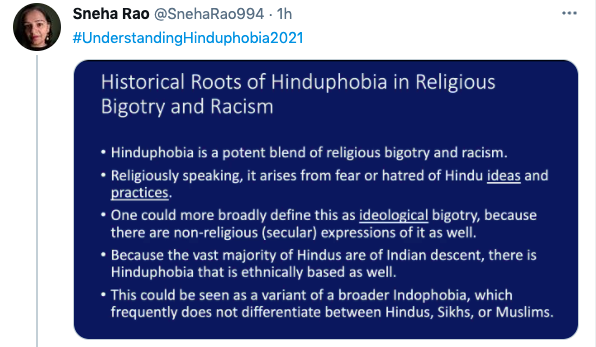
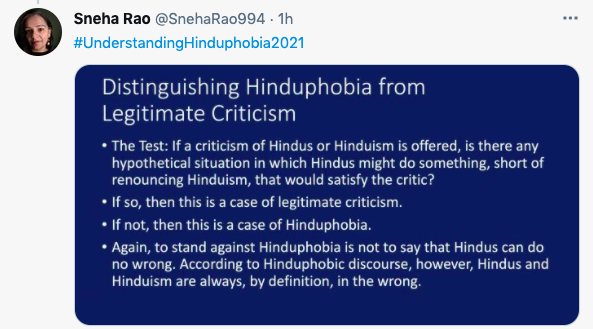
Megh Kalyanasundaram
Megh Kalyanasundaram
Megh Kalyanasundaram
Nagaraj Paturi
Conclusion
The bourgeoisie sets great store by status. Scholars go by a different criterion: knowledge. They know, through learning or personal experience, that for some of the great insights and discoveries we are indebted to outsiders and amateurs; and that quite a few of their colleagues have big titles and positions not corresponding to their actual knowledge. They also know that holding (or at least uttering) the required opinions can make or break an academic career: either formally, as when a non-Anglican could not get admission to Oxford University, or informally, as under the reign of progressivist conformism today.
To think highly of the academic world presupposes a link between scientific achievement and academic rank, and this largely makes sense in the exact sciences. In the humanities, especially in the social “science” and literature departments, this link is also deduced, but only as a parasitical extension of the conventions in the exact sciences. Much of what passes for scholarship these days is only ideology wrapped into jargon. Some sophomores take it seriously: having just gained entry into the academic world, they idealize it and are proud of their belonging to a higher world distinct from lay society. And most laymen believe it: over-awed by status, they assume that academic status presupposes both knowledge and objectivity, the basis of academic authority.
There exists a test for objective knowledge: a good theory predicts. Physicists who know the relevant parameters of an object in motion, can predict its location at future times. Well, how about the predictions by the academic India-watchers? In the mid-1990s, when the BJP’s imminent coming to power was a much-discussed probability, top academics predicted that a BJP government would turn India into a Vedic dictatorship, whatever that may be. They were put in the wrong even swifter than expected: in 1996, BJP leader AB Vajpayee was Prime Minister for 13 days, then lost the vote of confidence, and instead of seizing power for good, he meekly stepped down. Academics predicted the victimization of Dalits and women, gas chambers, “all the Indian Muslims thrown into the Indian Ocean”, and what not. Well, the BJP has been in power from 1998 till 2004, and since 2014: where are those gas chambers?
Scholars of modern India, as well as historians of fields relevant for contemporary political debates, have a lot to be modest about. They may have academic positions, but their record is not such that they are in a position to talk down to outsiders, the way Audrey Truschke now does.
To view this discussion on the web visit https://groups.google.com/d/msgid/bvparishat/CAJypMHe8SiGHfeXFDX3_v7pcbzFdecH4wJxhPWg5Od4TC-MS5w%40mail.gmail.com.
K S Kannan
To view this discussion on the web visit https://groups.google.com/d/msgid/bvparishat/CAJGj9eZ14MWsObUThQ5Uu8paAP8u4Xj1%3Dc-J9h7Bwj_5bTAYag%40mail.gmail.com.
--
Sant Rajinder Singh Ji Maharaj Chair Professor, IIT-Madras.
Nominated Member, Academic Committee, Kavi Kula Guru Kalidasa University, Ramtek.
Member, Academic Council, Veda Vijnana Shodha Samsthana.
Senior Fellow, ICSSR, New Delhi.
Academic Director, Swadeshi Indology.
Nominated Member, IIAS, Shimla.
Former Director, Karnataka Samskrit
University, Bangalore.
Former Head, Dept. of Sanskrit, The
National Colleges, Bangalore.
Sivanar
To view this discussion on the web visit https://groups.google.com/d/msgid/bvparishat/CAM%2BoyOdDtHo%3DzgBxwf7uW9%2BVL99xE22J%2Bh1v7P5qXF%2BJyAbzyQ%40mail.gmail.com.

